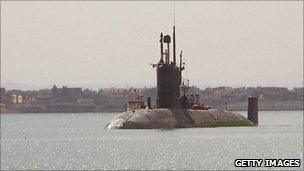Libya: UK joins in second night of missile strikes
- Published
The BBC's Mike Cartwright said the jets returned to RAF Marham in Norfolk after reports of 'civilians in the intended target area'
UK forces have taken part in a second night of missile strikes against Libya.
Tomahawk missiles were launched from a British submarine in the Mediterranean, but RAF Tornado bombers aborted their mission because civilians were in the area of their target.
The UK is part of an international coalition, also including the US and France, trying to protect civilians from attacks by Col Gaddafi's forces.
The Libyan military said it had ordered a ceasefire across the entire country.
Col Muammar Gaddafi's government had ordered a ceasefire on Friday, which was broken within hours, prompting the coalition's first attacks on Saturday night.
A Downing Street spokesman said the government was monitoring the situation closely after the latest ceasefire was supposed to take effect from 2100 local time (1900 GMT) on Sunday.
The new National Security Council sub-committee on Libya held its second meeting at No 10 on Monday morning.
Gaddafi's compound hit
Foreign Secretary William Hague told the BBC the decision to cancel the Tornado strikes showed Britain took "the greatest care to avoid civilian casualties".
He refused to be drawn on whether Col Gaddafi himself could be targeted in the military operations, adding: "That depends on the circumstances at the time."
But Defence Secretary Liam Fox said earlier that targeting the Libyan leader directly was "a possibility".
However, he told BBC Radio 5 live that such a move was problematic because "you would have to take into account any civilian casualties that might result from that, and at all times we are very careful to avoid that for its humanitarian reasons".
US defence spokesman Vice Adm William Gortney told a news briefing: "We are not going after Gaddafi.
"At this particular point I can guarantee he is not on the target list."
Nevertheless, in the past few hours, a missile strike on Col Gaddafi's compound in Tripoli has destroyed a building which coalition officials said was a command centre.
Elsewere, it has emerged that a British journalist, Dave Clark - working for the Agence France-Presse news agency - has gone missing in Libya with two colleagues.
British Al-Jazeera cameraman Kamel Atalua is still being held by the Libyan authorities several days after being detained in Tripoli.
Qatar planes
As well as Tornados - so far launched from RAF Marham in Norfolk - UK Typhoon jets are on standby in Italy.
A number of Hercules aircraft have also left RAF Coningsby in Lincolnshire, believed to be heading to the Mediterranean with equipment and supplies, and two Royal Navy ships are taking part in a naval blockade.

A British Trafalgar class submarine of the type in action in Libya, pictured recently
Other nations, including France, Spain, Denmark and Norway, are continuing to send military resources to enforce the UN-mandated no-fly zone.
And Qatar is due to become the first Arab country to play an active part by sending four planes.
The military action follows the passing of a UN resolution, external imposing a ban on all flights in Libyan airspace, excluding aid flights, and authorises member states to "take all necessary measures" to "protect civilians and civilian populated areas under threat of attack".
Col Gaddafi has ruled Libya for more than 40 years. An uprising against him began last month after the longtime leaders of neighbouring Tunisia and Egypt were toppled.